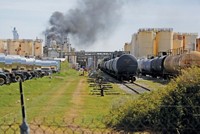Advertisement
Grab your lab coat. Let's get started
Welcome!
Welcome!
Create an account below to get 6 C&EN articles per month, receive newsletters and more - all free.
It seems this is your first time logging in online. Please enter the following information to continue.
As an ACS member you automatically get access to this site. All we need is few more details to create your reading experience.
Not you? Sign in with a different account.
Not you? Sign in with a different account.
ERROR 1
ERROR 1
ERROR 2
ERROR 2
ERROR 2
ERROR 2
ERROR 2
Password and Confirm password must match.
If you have an ACS member number, please enter it here so we can link this account to your membership. (optional)
ERROR 2
ACS values your privacy. By submitting your information, you are gaining access to C&EN and subscribing to our weekly newsletter. We use the information you provide to make your reading experience better, and we will never sell your data to third party members.
Industrial Safety
CSB urges more use of remote containment controls
Safety board says six major accidents could have been avoided or minimized
by Jeff Johnson, special to C&EN
July 31, 2024
| A version of this story appeared in
Volume 102, Issue 24

The US Chemical Safety and Hazard Investigation Board (CSB) is recommending that oil and chemical companies and regulators expand their ability to remotely isolate equipment at facilities in the US.
In a new safety study, the CSB says its investigations of several recent catastrophic incidents find that the chemical industry has failed to fully recognize the value of remotely operated isolation equipment. The board advocates the use of valves and other equipment that can cut off, redirect, or contain hazardous or flammable materials to quickly stop their release, preventing fatalities and serious injuries to workers.
Such equipment, the board says, should be engaged automatically or remotely, or be placed where it is easy to reach and safe for workers to activate.
In the study, the CSB discusses six severe oil and chemical facility incidents that could have been avoided or minimized with effective use of remotely activated or safely located equipment to contain a chemical release. The board calls on facility operators to assess whether remote isolation should be applied to major process equipment, even before any formal requirements are codified in industry standards and US regulations.
The study also makes specific recommendations to the American Petroleum Institute (API), a trade association, and two US regulators—the Environmental Protection Agency and the Occupational Safety and Health Administration. It calls on the API to require companies to consider remote controls and containment in its industry guidance documents. And it asks that regulators require an evaluation of the need for remote isolation capabilities in their risk management programs and process safety standards.
If implemented, the CSB says, the recommendations will enhance safety and reduce the consequences of incidents like the explosions and fires it investigates.




Join the conversation
Contact the reporter
Submit a Letter to the Editor for publication
Engage with us on Twitter